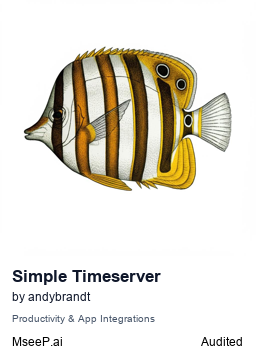About
A lightweight MCP server that supplies current local time, timezone data, and UTC via NTP, enabling Claude to reference real-world time in conversations.
Capabilities

Overview
The MCP Simple Timeserver fills a notable gap in Claude’s conversational experience: the lack of reliable time awareness. By exposing two straightforward tools— and —the server grants an AI assistant the ability to reference both the user’s local clock and a globally synchronized UTC source. This capability is essential for any context that relies on temporal reasoning, scheduling, or time‑based calculations.
What the Server Solves
Claude’s internal model does not retain message timestamps or have direct access to the system clock. Consequently, it cannot answer questions like “What time is it now?” or determine how long ago a prior interaction occurred. The Simple Timeserver eliminates this limitation by offering deterministic, server‑side time queries that the model can invoke on demand. Developers no longer need to hard‑code timestamps or embed them manually into prompts; the assistant can fetch fresh time data whenever required.
Core Functionality
- : Retrieves the current date, time, and timezone information from the machine where the MCP server is running. This tool enables Claude to know exactly what time it is for the user, and can be used to compute elapsed durations between messages or events.
- : Contacts an NTP server to obtain the current Coordinated Universal Time. This provides a reliable, globally consistent reference point that is useful for logging, cross‑regional coordination, or any scenario where UTC is the standard.
Both tools are intentionally minimalistic yet fully functional, ensuring low latency and straightforward integration with existing MCP clients.
Use Cases & Scenarios
- Scheduling Assistance: An assistant can propose meeting times that respect the user’s local timezone, or convert between time zones on request.
- Time‑Based Reminders: By calculating elapsed time, Claude can trigger reminders or follow‑ups after a specified interval.
- Event Planning: When coordinating events across multiple regions, the server’s UTC tool guarantees that all participants are referencing the same baseline time.
- Logging & Auditing: Developers can embed timestamps in logs or transcripts, improving traceability and debugging.
Integration with AI Workflows
In an MCP‑enabled environment, the Simple Timeserver is added to the client’s configuration as a standard server. Once registered, any prompt can include a tool call like or . The assistant’s reasoning engine treats the returned timestamp as any other data point, allowing it to weave time information seamlessly into responses. Because the server operates over a simple HTTP interface, it can be hosted locally for privacy or deployed as a public endpoint for broader access.
Unique Advantages
- Simplicity: Only two tools, no complex setup or heavy dependencies.
- Reliability: Local time reflects the user’s machine settings, while UTC is sourced from NTP for precision.
- Compatibility: Works with any MCP client that supports standard tool calls, making it a drop‑in solution for existing Claude deployments.
- Security: The server is lightweight and does not expose sensitive data beyond the time information, minimizing attack surface.
By bridging Claude’s conversational model with accurate temporal data, the MCP Simple Timeserver empowers developers to build richer, context‑aware AI assistants that can reason about time without cumbersome workarounds.
Related Servers
MindsDB MCP Server
Unified AI-driven data query across all sources
Homebrew Legacy Server
Legacy Homebrew repository split into core formulae and package manager
Daytona
Secure, elastic sandbox infrastructure for AI code execution
SafeLine WAF Server
Secure your web apps with a self‑hosted reverse‑proxy firewall
mediar-ai/screenpipe
MCP Server: mediar-ai/screenpipe
Skyvern
MCP Server: Skyvern
Weekly Views
Server Health
Information
Explore More Servers
X Twitter MCP Server
AI‑driven X (Twitter) interaction via natural language commands
AI Makerspace MCP Event Server
Web search via Tavily in MCP protocol
Python Local MCP Server
Interactive Python REPL over MCP
Simple Time MCP Server
Provide current time via JSON-RPC
大学院废墟 MCP Server
MCP-powered access to Chinese Magic: The Gathering card data
NexusHub
Unified MCP Bridge for Claude AI with Files, DB, Docker